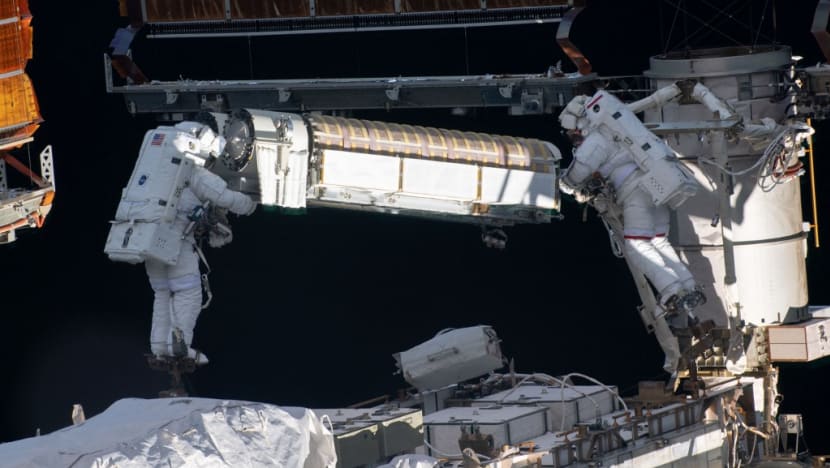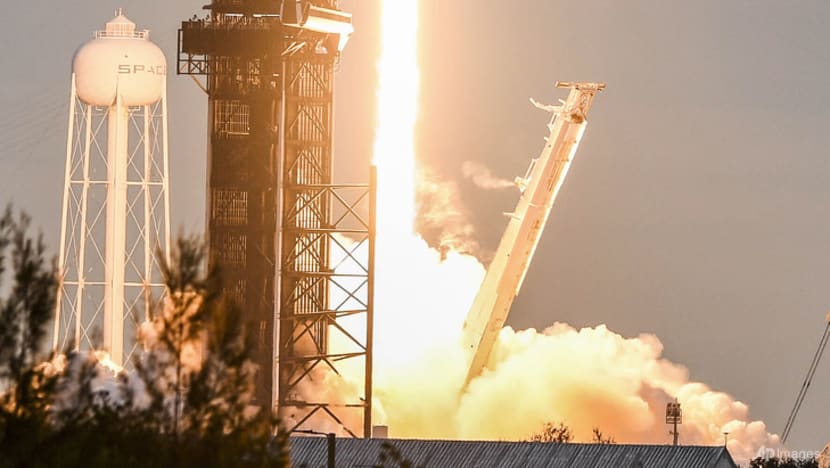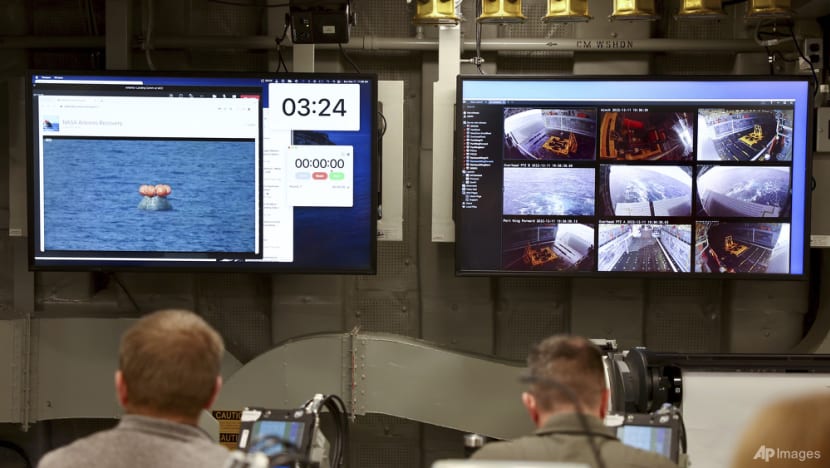Commentary: The new space race could turn science fiction into reality
Public and private actors are duking it out for extraterrestrial control, says the Financial Times' Rana Foroohar.

Spacewalkers Shane Kimbrough of NASA (left) and Thomas Pesquet of the European Space Agency installing new roll out solar arrays on the International Space Station's P-6 truss structure on Jun 20, 2021. (Photo: Handout/ NASA/AFP)
NEW YORK: The last few years have been marked by trade wars and hot wars. This year may bring with it star wars, as space - the “final economic frontier” - becomes the focus of a global race for dominance by both public and private actors.
Elon Musk’s SpaceX, Jeff Bezos’ Blue Origin, Orbital ATK, ViaSat, SES, OneWeb and more than 10,000 other commercial space companies have grown over the past two decades into a burgeoning sector known as “new space", dedicated to growing private space access and space station servicing to satellite operations, defence technology, data analytics and even more speculative areas like space tourism, manufacturing and asteroid mining.
SpaceX is the best known new space player, having launched thousands of satellites for both public and private use. Musk’s Starlink service has kept the Ukrainian Internet up and running even as Russian forces shut down other telecommunications. But it has also become a potential target for Moscow’s military, even as Musk haggled with the Pentagon over the cost of keeping the Ukrainians online.
This underscores a growing debate over who should control the space economy, which was worth US$469 billion in 2021, according to the non-profit Space Foundation, and is predicted by the Bank of America to be a US$1.4 trillion industry by 2030.
Revenues in the commercial space sector were up 6.4 per cent from 2020, according to the Space Foundation’s 2022 Space Report, with much of the growth driven by a 19 per cent increase in government spending on military and civilian space programmes (India’s spending was up 36 per cent, followed by China’s at 23 per cent and 18 per cent in the United States).

MONOPOLY POWER
While space exploration used to be about state-backed programmes focused on national security, national pride and scientific research, the US started pulling back on centralised government control of space after two fatal space shuttle accidents (the Challenger in 1986 and Columbia in 2003). This led a presidential commission on US space exploration policy to conclude in 2004 that “NASA’s role must be limited to only those areas where there is irrefutable demonstration that only government can perform the proposed activity".
While public-private satellite programmes had existed since the 1960s, it wasn’t until the shuttle programme began winding down (and was ultimately cancelled in 2011) that the new crop of commercial space companies began to take off. Congress shifted funding incentives and created a new policy (the Commercial Orbital Transportation Services programme) to encourage privatisation. NASA and other government agencies became customers of private space contractors, rather than creators or even supervisors of new technologies.
As with all privatisation, the idea was to drive down costs and increase innovation. NASA data from 2014 shows that SpaceX was able to deliver 1kg of cargo to the International Space Station at about a third of the price of the Space Shuttle. Private flights now conduct the majority of resupply missions for the space station, and even transport some crew.
But as Harvard Business School professor Matthew Weinzierl has argued, while costs decreased and innovation in the reuse of materials and equipment increased, so did monopoly power. A handful of new space companies could piggyback on NASA technologies that took decades to develop, while the established contractors that helped build them lost out. Taxpayers who funded the basic research got no stake in the wealth being created by billionaires in space, the largest public commons of all.

LAWS NEED A REFRESH
In many ways, this mirrors the public-private asymmetries of power seen in the building of 19th century railroad fortunes (which led to the last great era of US trustbusting in the 1930s) or in the commercialisation of the Internet, in which a handful of big tech companies profited above all others.
But the new space race is far more complex, because of the scale and the potential for damage. Space debris - including defunct satellites, spacecraft parts and the junk created by collisions between them - are becoming a major risk factor in space travel. But there is no consensus on who should pay for, clean up, or arbitrate the fallout from collisions.
The main law governing space commons is still the cold war-era Outer Space Treaty of 1967, which has little to say about modern space technologies. It simply prohibits putting nukes or other weapons of mass destruction into space.
Optimists would argue that the potential profits from commercialising space will more than pay for debris clean-up, or that better regulation will naturally follow innovation. But it’s all too easy to imagine any number of sci-fi style disasters, from the creation of off-world colonies where the rich are able to escape the problems of this planet (for a price), to evil billionaires hoarding rare earth minerals in space.
Amazingly, Weinzierl suggests, Luxembourg is already positioning itself to be for space companies what Delaware is for US corporations looking to avoid taxes.
This is unacceptable. But tackling these and myriad other issues posed by the commercialisation of space will require the sort of global co-operation currently lacking on Earth.

















